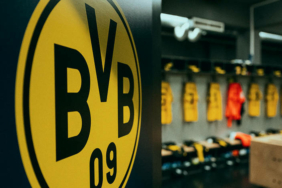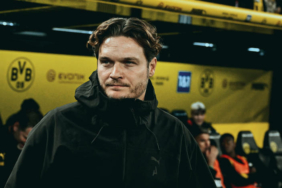To mark the anniversary of the November pogroms, the BORUSSEUM hosted a discussion with a survivor on Wednesday evening. Pavel Taussig, who survived the Holocaust, was the guest and spoke about his experience of being sent to the Nazi concentration camps as an eleven-year-old boy.
At the beginning of the evening, club president Dr Reinhold Lunow took the floor and reminded everyone to look not only to the past, but also to the present. Hamas’ terrorist attack on Israel has made the issue of anti-Semitism more relevant than ever. “On behalf of BVB, I would like to express our deepest sympathy and solidarity with our friends and civilians in Israel. We must take a firm stand against anti-Semitism and hatred,” said Lunow. The life and story of Pavel Taussig is “a cautionary reminder that peace and freedom must never be taken for granted.”
When 89-year-old Pavel Taussig talks to Martin Kranz, director of the ACHAVA Festival Thuringia, about his life, silence falls in the BORUSSEUM. The more than 100 guests listen attentively to his personal testimony. Nobody wants to miss a word. When Taussig was born in Bratislava, Czechoslovakia, in November 1933, Hitler had only been in power for a few months. Pavel Taussig grew up in comfortable and prosperous surroundings. His parents had him baptised and converted to the Protestant faith themselves in the hope that this would protect them from anti-Semitic persecution.
Exclusion and oppression
“I enjoyed advantages as a result, such as being allowed to attend a public school,” he recalls. His parents hid the fact that he had Jewish roots. He was ostracised at school, but didn’t know why. Baptism offered protection for a while, but not forever. When the Slovakian state, a puppet of Nazi Germany, was founded in March 1939 under pressure from Hitler’s government, Nazi marginalisation and repression of the Jewish population began. It was only then that Pavel Taussig learnt of his Jewish roots. “We need to have a serious talk with you,” his parents said on the day it was decreed that children with Jewish roots would no longer be allowed to play in the park. Little Pavel spent every day in the park. “I felt bad about it, mistreated. I didn’t do anything wrong and still wasn’t allowed in the park. And I faced other restrictions too,” Taussig remembers today.
Jewish people were eventually arrested. The family was sent to a transitory detention centre, from where the trains mainly travelled to Auschwitz. “We were only in the detention centre for a very short time. Compared to what came later, it was a recreation centre.” The prisoners were herded into cattle wagons for further transport. For little Pavel, it felt like a school trip with his parents. “They were very careful not to say anything unpleasant to me. That worked until one of my fellow travellers slit his wrists.” The listeners are audibly startled by this statement, which the contemporary witness recites calmly and deliberately, as he has done throughout his life. He remained silent for a long time, until about ten years ago, he decided to tell his story to make sure it is never forgotten.
Deportation to Auschwitz-Birkenau
The family was deported to Auschwitz-Birkenau on 3 November 1944, three weeks before Pavel’s 11th birthday. “In Auschwitz, it was just like you see in the pictures. We were told to line up and were then led to our barracks. Everyone who had been there for a while stopped and stared at us. We couldn’t understand what was so unusual about us.” There were no children in Birkenau before this, they were sent straight to the gas chambers. Pavel’s train was the last transport which came in to drop prisoners off at the concentration camp. There was no longer a process of selecting groups of prisoners to be gassed, meaning the camp contained old people, disabled people and children.
The parents pass their child off as a 14-year-old so that he can get a prisoner number tattooed on him. “If they go to the trouble of tattooing him, they won’t kill him the next day, they’ll still need him,” they thought. In the camp, Pavel Taussig was separated from his parents, whom he would not see again until after the liberation. On 1 January 1945, he was ordered to go on what was known as a death march.
After the Auschwitz extermination camp, he was sent to the Mauthausen concentration camp, then to its satellite camp in Melk, back to Mauthausen and finally to its satellite camp in Gunskirchen. The last camp has not yet been completed. It was raining through the roof and there was no water supply. “I wanted to drink from a water basin. But when I reached in, I realised that a dead woman was lying there.” The audience in the BORUSSEUM are startled again, their faces full of disbelief. “The last camp in Gunskirchen was so terrible and I was so close to dying that I have few memories,” says Taussig. After surviving several camps and death marches, he was liberated on 4 May 1945, a half-starved, seriously ill child dressed in rags. Pavel had life-threatening tuberculosis: “I was sad. ‘Now I’ve been free for two days and I’m going to die’, I thought.” He only recovered after a year in a sanatorium in the High Tatras.
Life as an editor
Taussig spoke at length about the tragic events of his life during the testimony interview. After graduating from university, he worked as the editor of a satirical magazine in Bratislava and later for Pardon and Titanic. Today he lives in Frankfurt am Main.
When Taussig had spoken his final word, the sound of applause reverberated around the BORUSSEUM, as the audience thanked him.. “It was another fascinating evening. I’m always glad to meet people who have experienced this tragedy and are willing to share it with us so that we can learn from history,” said Dr Reinhold Lunow.
BVB-TV: discussion with Pavel Taussig















